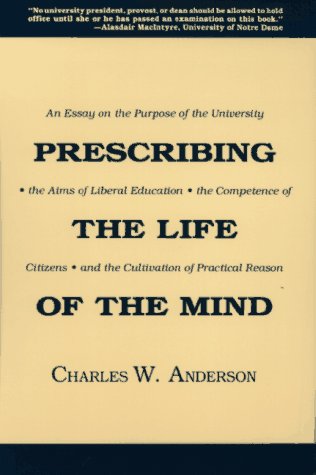University of Wisconsin Press
Prescribing the Life of the Mind: An Essay on the Purpose of the University, the Aims of Liberal Education, the Competence of Citizens, and the Cultiv
Regular price
$9.95 USD
Regular price
Sale price
$9.95 USD
Unit price
per
Shipping calculated at checkout.
Couldn't load pickup availability
Title: Prescribing the Life of the Mind: An Essay on the Purpose of the University, the Aims of Liberal Education, the Competence of Citizens, and the Cultiv
Author: Charles W Anderson
ISBN: 0299138305
Publisher: University of Wisconsin Press
Published: 1993
Binding: Hardcover
Language: English
Condition: Used: Very Good
Clean, unmarked copy with some edge wear. Good binding. Dust jacket included if issued with one. We ship in recyclable American-made mailers. 100% money-back guarantee on all orders.
B 1696566
Publisher Description:
What are the purposes of the university? What should be the aims of liberal education? With phrases like "cultural relativism, " "political correctness, " "cultural literacy, " and "canon wars" buzzing through the halls of academia and of government and appearing almost daily in heated public debates, these are important questions. With good will and common sense, Charles W. Anderson enters the fracas. He argues that teaching students to think, by developing their capacity for practical reason, can provide unifying mission for the university and an integrating theme for the curriculum. A distinguished political philosopher with years of experience teaching in undergraduate liberal arts programs, Anderson shows here how the ideal of practical reason can reconcile academia's research aims with public expectations for universities: the preparation of citizens, the training of professionals, the communication of a cultural inheritance. It is not good enough, he contends, to simply say that the university should stick to the great books of the classic tradition, or to denounce this tradition and declare that all important questions are a matter of personal or cultural choice. By applying the methods of practical reason, teachers and students will think critically about the essential purposes of any human activity and the underlying arguments of any text. They will have standards of excellence and rigor to use as tools in all fields. Prescribing the Life of the Mind suggests that the exercise of practical reason can accommodate and bring together the diverse factions and points of view now at war in the universities: the scientists and the humanists, those who teach classic rationalism andthose who insist on postmodernist perspectives. Readers both within and beyond the academic community will welcome Anderson's practical and thoughtful approach. In addition to his convincing arguments, Anderson makes specific curriculum-building suggestions that should promote livel
Author: Charles W Anderson
ISBN: 0299138305
Publisher: University of Wisconsin Press
Published: 1993
Binding: Hardcover
Language: English
Condition: Used: Very Good
Clean, unmarked copy with some edge wear. Good binding. Dust jacket included if issued with one. We ship in recyclable American-made mailers. 100% money-back guarantee on all orders.
B 1696566
Publisher Description:
What are the purposes of the university? What should be the aims of liberal education? With phrases like "cultural relativism, " "political correctness, " "cultural literacy, " and "canon wars" buzzing through the halls of academia and of government and appearing almost daily in heated public debates, these are important questions. With good will and common sense, Charles W. Anderson enters the fracas. He argues that teaching students to think, by developing their capacity for practical reason, can provide unifying mission for the university and an integrating theme for the curriculum. A distinguished political philosopher with years of experience teaching in undergraduate liberal arts programs, Anderson shows here how the ideal of practical reason can reconcile academia's research aims with public expectations for universities: the preparation of citizens, the training of professionals, the communication of a cultural inheritance. It is not good enough, he contends, to simply say that the university should stick to the great books of the classic tradition, or to denounce this tradition and declare that all important questions are a matter of personal or cultural choice. By applying the methods of practical reason, teachers and students will think critically about the essential purposes of any human activity and the underlying arguments of any text. They will have standards of excellence and rigor to use as tools in all fields. Prescribing the Life of the Mind suggests that the exercise of practical reason can accommodate and bring together the diverse factions and points of view now at war in the universities: the scientists and the humanists, those who teach classic rationalism andthose who insist on postmodernist perspectives. Readers both within and beyond the academic community will welcome Anderson's practical and thoughtful approach. In addition to his convincing arguments, Anderson makes specific curriculum-building suggestions that should promote livel

